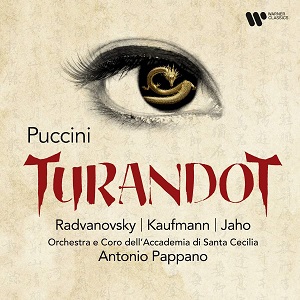
Giacomo Puccini (1858-1924)
Turandot – opera in three acts (1926)
Calaf, the Unknown Prince (tenor) – Jonas Kaufmann
Princess Turandot, his daughter (soprano) – Sondra Radvanovsky
Liù, a young slave girl (soprano) – Ermonela Jaho
Timur, his aged father, exiled king of Tartary (bass) – Michele Pertusi
Emperor Altoum of China (tenor) – Michael Spyres
Ping, the Grand Chancellor (baritone) – Mattia Olivieri
Pang, the General Purveyor (tenor) – Gregory Bonfatti
Pong, the Chief Cook (tenor) – Siyabonga Maqungo
Prince of Persia (tenor) – Francesco Toma
A Mandarin (baritone) – Michael Monfidian
Orchestra, Coro e Voci Bianche dell’Accademia Nazionale di Santa Cecilia/Sir Antonio Pappano
rec. 2022, Parco della Musica, Rome
Warner Classics 5419740659 [2CDs: 128]
My colleague Lee Denham gave this a decidedly tactful, qualified welcome in his recent review – and let me say right away that I endorse his statement that, following his extensive survey of recordings of the opera, “the Decca recording, released fifty years ago in 1973, is still the most recommendable version available, with no weak links in the cast, fine sound and excitingly conducted by the young Zubin Mehta” – and that is why I, too, included it in my own survey of “Untouchable” recordings.
Of course, the USP of this new recording is that it uses Alfano’s extended ending rejected by Toscanini – but again, Lee and I both conclude that John Mauceri’s recording of that with Josephine Barstow (review) back in 1989 is rather better than the version here.
That is not to say that this latest release is without merit: the depth and brilliance of the sound is immediately apparent – but then so is the ordinariness of the baritone singing the Mandarin who declares Turandot’s laws. We then a hear from Ermonela Jaho a fuller, older-sounding Liù than is ideal; her vibrato sometimes borders on the obtrusive, but she sings …very nicely. Her best moment comes in Act 3 with “Signor, non parlerò!” where she floats some high notes seductively but compared with illustrious predecessors like Caballé and Moffo she lacks “face”. My reservations about her, however, are as nothing compared to my reaction to the shockingly hollow, worn sounds produced by both Jonas Kaufmann and Michele Pertusi. Kaufmann now has absolutely no gleam, or squillo in his tone; the volume is limited – I suspect some boosting from the sound engineers – and the constant glottal catch in his line is irritating, making me long for the Calaf of Björling or Pavarotti. He also too often resorts to a kind of crooning; in brief, the voice is unattractive and not how a Puccini tenor is meant to sound. Pertusi’s bass, too, is a shadow of a voice: dry, laboured and without substance. Zaccaria, Tozzi, Giaiotti, Ghiaurov and a whole host of great basses are infinitely preferable. Michael Spyres was presumably asked to sing the Emperor for the cachet of his name in the cast-list but that is perversely at odds with Puccini’s instructions for the voice-type required. He obviously makes the effort to sound a bit quavery, but with only partial success. The Ping, Pang and Pong are unobjectionable but rather throaty; there was a time when singers of the calibre of Mario Sereni, Renato Capecchi, Robin Leggate and Piero De Palma were cast in that trio. They actually have quite a lot of good music to sing at the start of Act Two, so you want the best voices.
So far, then, not a single solo voice really comes up to scratch, which leaves only Sondra Radvanovsky to consider. She is an artist I have long admired and heard live, when the amplitude of her soprano was confirmed. Indeed, its sheer volume is straight away apparent – apparently drowning out Kaufmann was an issue in the preceding live concert performances and that is the case even here in “Gli enigmi sono tre”. She can fine away her tone to sing softly and steadily, too. She does not have the most beautiful of timbres but it is a big, healthy sound, thrilling in its power and penetration. Her diction is fine, her inflection of text thoughtful and she occasionally dips into her lower register for effect. She softens credibly in her exchanges with Liù and takes advantage of the extended ending to inject as much verisimilitude as possible into her “conversion”. In short, she is by far the best singer in this recording – although not necessarily preferable to Nilsson, Sutherland – or even Slatinaru.
The chorus is excellent and the balances between it and the orchestra reveal more of the detail in the score than I have previously heard anywhere. I very much like Pappano’s conducting; he frequently allows more time to bring out nuances and delicacies, such as the flute and woodwind “noodlings” in “Perché tarda la luna”, track 5, and the eerie pizzicato strokes in track 8, “O divina bellezza”, and he really encourages the chorus to let rip in the big ensembles.
Apart from the provision of the extended final scene, the presence of Radvanovsky, alongside Pappano’s conducting, the contributions of the chorus and orchestra and the spectacular sound cumulatively constitute the attractions of this set – but as a whole, the inadequacy of the casting makes it something of a disappointment.
Ralph Moore
Previous review: Lee Denham (March 2023)
Help us financially by purchasing from




















